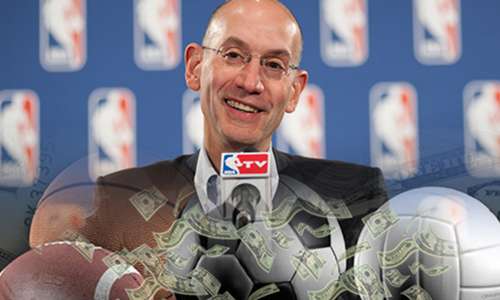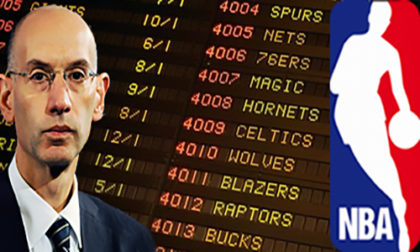Here We Go: NBA Officially Pushes for Legalized Sports Betting
Finally, after ages of trying to convince the public that they were against sports betting because it could damage the “integrity of the game,” one U.S. professional sports league is admitting what was obvious: sports betting is good for the leagues. On Wednesday, NBA attorney Dan Spillane testified in front of the New York State Senate Standing Committee on Racing, Gaming and Wagering, laying out the league’s vision – demands, really – for sports-betting legislation, either on the federal level, or as a model which each state can copy.
As mentioned, this was likely an inevitability. NBA Commissioner Adam Silver, almost from the moment he took the position, had publicly expressed his desire to see sports betting legalized and regulated on the federal level. In his statement, Spillane echoed the same basic things Silver has spoken and written about over the last few years, making a similar case to the one that has been made for online poker:
… illegal sports betting remains widespread in the United States. It is impossible to measure the amount of betting with any precision. But many experts estimate that illegal betting in the U.S. is in the range of $100 to $200 billion per year, and some think the number is even higher. These bets are taken in a black market that does not support local businesses, cannot be taxed, and most important from our perspective, cannot be monitored or regulated.
At the same time, legal non-sports gambling has become more popular and accepted. Most states offer lotteries, and there are hundreds of legal casinos and race tracks across the country. Regulated online gambling is still in its early stages but also is growing.
Spillane went on to explain that regulations have worked in England, where people can place bets on games in a wide variety of ways, even right there at the stadium.

NBA Commissioner Adam Silver
The NBA, as Adam Silver has said in the past, would highly prefer federal legislation, so that regulations are uniform across the country, but if that’s not possible, the league would like “a comprehensive sports betting bill that would serve as a model for a 50-state solution,” even if it has to be on a state-by-state basis.
Spillane then laid out five components that the NBA feels any legislation must have. Most of it is fairly standard – consumer protections, online and mobile permitted, systems that can track suspicious betting patterns, etc. – but one point will loom controversial: the NBA wants the sports leagues to get one percent of all wagers. Said Spillane:
….the legislation should recognize that sports leagues provide the foundation for sports betting while bearing the risks that sports betting imposes, even when regulated. Without our games and fans, there could be no sports betting. And if sports betting becomes legal in New York and other states, sports leagues will need to invest more in compliance and enforcement, including bet monitoring, investigations, and education. To compensate leagues for the risk and expense created by betting and the commercial value our product creates for betting operators, we believe it is reasonable for operators to pay each league 1% of the total amount bet on its games. This approach draws from how sports betting is legally regulated in some other international jurisdictions, like Australia and
France.
I suspect that if regulation does happen, the NBA will get its way, as the leagues and team owners have a lot of clout. Frankly, though, it’s a ludicrous proposition. While I understand the reasoning behind the request (demand?), the leagues don’t need to get a cut. They currently make money indirectly off of sports betting and will make more if it is legalized throughout the United States. Sports betting – both legal and illegal – as well as fantasy sports generate interest in the leagues from people who might not otherwise care about the games. That interest translates to television viewers, which translates to dollars. Many of those sports bettors and fantasy players develop fanhoods and end up going to games, buying merchandise, etc. You get the point. If sport betting didn’t exist, interest in the leagues would be significantly lower.
Additionally, this one-percent fee came up earlier this month when the NBA and Major League Baseball consulted with Indiana State Representative Alan Morrison for the sports betting bill he introduced. Included in the bill was a 1 percent “integrity fee” to go to the leagues. In addition to it being an unnecessary cash grab, gambling law expert Professor I. Nelson Rose illustrated on his blog that it would make it extremely difficult, even impossible in some situations, for sports betting operators to make a profit.
The problem is that the 1 percent is on wagers places, not on the profit the sports books make on those wagers. He used Nevada’s recent historical figures as an example. The average sports book took in $25 million in bets per year and made 4.16 percent – $1.04 million – on those wagers. In Indiana, there is a 9.25 percent tax on gross gaming revenue as well as a 0.25 percent tax on “handle,” which means total bets (the one-percent proposed fee is on handle).
That equates to $96,200 in Indiana state gambling taxes, $62,500 in federal taxes, and… get this… $250,000 for that one-percent integrity fee, the same fee the NBA proposed in New York this week. Subtract all of that from the $1.04 million and a sports book would make just $631,300 off of $25 million in wagers. And that’s before all of the other expenses, including corporate income taxes, insurance, salaries, and so on and so forth.
Professor Rose said, “I personally would never invest a cent into a business like this.”
On the bright side, it is great that one of the professional sports leagues in the United States has not only acknowledged that sports betting isn’t evil, but finally, officially said that it wants sports betting legalized. It is also a sign that the NBA feels that the leagues will lose the PASPA case that the Supreme Court recently heard.
The one-percent fee is silly, but it’s a starting point, so let’s see where it goes.

















COMMENTS